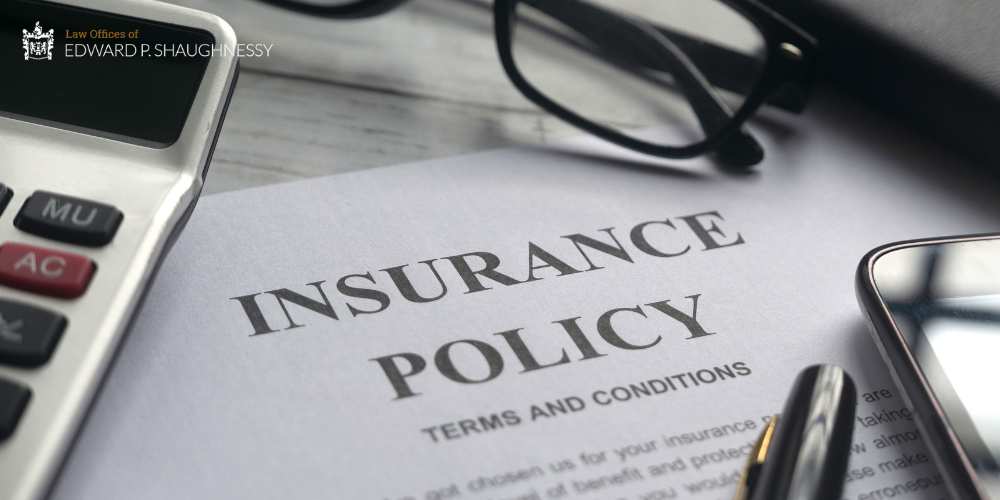Bad Faith Insurance Attorney Easton, PA
Home » Practice Areas » Easton Civil Litigation Attorney » Easton Insurance Claim Lawyer » Bad Faith Insurance Claims
Practice Areas
Easton bad faith insurance attorney Edward P. Shaughnessy is your trusted advocate when dealing with complex legal matters surrounding bad faith insurance claims. With his extensive experience, he understands the tactics an insurance company may employ to avoid fulfilling their contractual obligations to a policyholder. In cases where insurance companies act unfairly or unreasonably, leaving policyholders without rightful compensation, experienced attorney Shaughnessy tirelessly fights for justice. As a seasoned bad-faith insurance attorney, he knows the intricacies of how insurers fail to uphold their end of the contract, leading to detrimental consequences for those they are meant to protect.
If you’ve suffered actual damages due to an insurer’s misconduct, Easton bad faith insurance attorney Ed Shaughnessy is the experienced attorney you need to navigate the complexities of a bad faith case. As your dedicated Easton bad faith insurance lawyer, he will work tirelessly to ensure that you receive the compensation you rightfully deserve from your bad faith insurance claim.
Contact an Easton bad faith lawyer to schedule your free consultation at the Law Offices of Edward P. Shaughnessy; call (610) 258-9955 or complete the online intake form today.

What is Bad Faith?
Bad faith in insurance involves dishonest practices by insurance companies, such as unjustly denying a covered claim without a reasonable basis, delaying payments on an insurance claim, violating insurance policy terms, and neglecting fair claim processing. This contrasts with good faith, where insurers are expected to handle a covered claim honestly and promptly.
The corrupt or dishonest actions that constitute bad faith breach the implied covenant of good faith and honorable dealing expected in the insurance contract, potentially leading to a bad faith claim against the insurer.
Pennsylvania Laws Surrounding Bad Faith Claims
Pennsylvania has specific laws addressing bad faith insurance practices. Under Pennsylvania law, an insurer is required to act in good faith when handling insurance claims. This means that insurers must handle claims promptly, fairly, and honestly. If an insurer denies a claim without a reasonable basis, fails to investigate a claim thoroughly, or engages in other unfair practices, they may be liable for bad faith.
Pennsylvania’s bad faith laws allow policyholders to seek damages, including punitive damages, if they can demonstrate that the insurer acted in bad faith. It’s important for individuals dealing with insurance disputes in Pennsylvania to consult with a qualified Easton civil litigation attorney who is knowledgeable about Pennsylvania’s bad faith laws to ensure their client’s rights are protected.
These laws underscore the principle that insurance contracts are not merely financial agreements but include an inherent promise of good faith and fair dealing by the insurer, ensuring that policyholders receive the protection they have paid for and are entitled to under their policies.
Examples of Bad Faith Tactics
Insurance companies often employ bad faith tactics when handling claims, damaging the trust between policyholders and insurers. These tactics, typically considered bad faith, include unjust claim denials, excessive payment delays, and biased investigations.
For instance, insurers may deny valid claims based on ambiguous policy terms or delay payments, causing financial strain. Another form of bad faith is when insurers fail to disclose benefits or offer low settlements, causing significant hardships for policyholders. These actions can lead to bad faith claims, allowing policyholders to seek compensation and punitive measures against unethical practices.
What To Do If an Insurance Company Will Not Pay a Claim in Lehigh Valley
An insurance company may constitute bad faith when they refuse to pay a claim, making it crucial for policyholders to take strategic steps to protect their interests. Understanding the denial reasons, reviewing policy coverage, and gathering relevant documentation, including correspondence with the insurance carrier, are crucial initial actions. Submitting a written appeal to the insurance company citing policy limits and disputing inaccuracies is recommended.
If the insurer continues to avoid paying, doesn’t offer a reasonable settlement, or offers a settlement significantly below policy limits, therefore violating the terms of the contract, the policyholder will need to seek legal advice from an Easton bad faith attorney, as potential litigation may be necessary.
Legal action can aim to recover the claim amount, interest, and additional damages for egregious conduct. Reporting the issue to state insurance regulators can also prompt investigations into insurer practices, offering another avenue for resolution.

Ask Your Insurance Company Why the Covered Claim Was Denied
If your insurance claim is denied, act promptly to understand the reasoning behind it and protect your interests. Request a detailed explanation in writing from your insurer, citing policy terms and limits, and ask for clarification on any exclusions or conditions cited. Express your willingness to provide additional evidence for reconsideration. This proactive approach establishes a formal record of your efforts, which can be valuable for future actions to secure your benefits.
Use Your Insurance Policy Wisely
Utilize your insurance policy effectively by understanding coverage, promptly reporting claims, and maintaining detailed records. In disputes, your knowledge of policy terms and evidence is vital. Review your policy regularly, especially after significant life events, to ensure adequate coverage. Seek legal advice if issues arise to understand your rights and the best actions to take. Acting proactively and informedly safeguards your interests and maximizes your policy’s benefits.
Use Mediation to Come to a Reasonable Settlement
With a bad faith claim, mediation can serve as an effective alternative to lengthy court battles. This strategy involves both parties—the policyholder and the insurer—coming together with a neutral third-party mediator to discuss the issues at hand and work towards a mutual agreement.
Mediation is particularly valuable in bad faith cases, as it provides an opportunity to avoid the complexities and uncertainties of law and court proceedings while still securing a fair outcome for the aggrieved policyholder. Opting for mediation can save time, reduce legal expenses, and potentially mend the relationship between the insurer and the insured, making it a wise choice for resolving disputes amicably.
File a Bad Faith Insurance Claim
To file a statutory bad faith claim against your insurer, start by collecting all documents and correspondence related to the dispute. Document interactions with the insurer that highlight their refusal to honor a covered claim. Then, consult with an experienced Easton bad faith lawyer who practices insurance law.
Easton bad faith attorneys can evaluate your bad faith case, advise on the best legal strategy, and assist with filing the bad faith claim, ensuring you meet all legal criteria and effectively present your case. This approach enhances your chances of securing a favorable resolution, whether through settlement or litigation in court.
What is a Bad Faith Insurance Claim?
A bad faith insurance claim arises when insurance companies act against the common law principles of fair dealing owed to their policyholders. This can involve unjust denial, delaying payment without a valid reason, refusing to pay the full value of covered services, or not conducting a proper investigation.
These actions are considered bad faith because they breach the insurer’s obligation to act in the best interest of their clients despite the insurance premiums paid by policyholders for protection against specified risks. Bad faith claims give policyholders the right to take legal action against their insurers, seeking not only the payment of the originally denied claim but also potentially additional damages for the insurer’s wrongful conduct.

Types of Bad Faith Insurance Claims
Bad faith insurance claims encompass a range of scenarios where an insurer fails to meet its obligations to policyholders. One type involves insurers wrongfully denying or delaying valid claims, such as when a homeowner’s insurance company refuses to compensate for damages after their house burns down despite the claim falling within the policy limits. Another example includes insurers failing to handle claims promptly or fairly, violating both statutory requirements and common law principles.
For instance, an insurer might unreasonably interpret policy terms to avoid paying a valid claim promptly or do not adequately investigate the claim, leading to unnecessary delays in payment. These actions can result in statutory bad faith claims, as they contravene regulations outlined in the Unfair Claims Practice Act and other relevant statutes aimed at safeguarding policyholders from unjust treatment by insurers.
How to Sue an Insurance Company for Bad Faith in Pennsylvania
In Pennsylvania, to successfully sue an insurance company, the policyholder must prove that the insurer neglected to uphold its contractual obligations in handling claims. This involves demonstrating that the insurer acted unreasonably when handling the claim, such as by denying it without a valid reason, delaying payment without justification, or offering an unreasonably low settlement.
It’s essential to show that the insurer breached its duty of good faith and fair dealing owed to the policyholder under the insurance contract. Given the complexities of such cases, seeking representation from experienced attorneys specializing in insurance law is crucial.
These Easton bad faith attorneys can navigate the legal process, gather evidence to support the claim, and advocate on behalf of the policyholder. In Pennsylvania, if the policyholder prevails in a lawsuit, they may be entitled to compensation for punitive damages, including lawyer fees, incurred as a result of the insurer’s wrongful actions.

Damages in Bad Faith Claims
In bad faith claims against insurers, policyholders may seek compensation for various damages beyond the original claim amount. These damages can include financial losses incurred due to the insurer’s refusal to pay, such as legal fees, interest on delayed payments, and consequential expenses resulting from the insurer’s wrongful conduct.
Moreover, policyholders may pursue damages for emotional distress or mental anguish caused by the insurer’s actions, reflecting the broader impact of bad faith practices on their lives.
In cases where insurers’ actions are deemed particularly egregious, policyholders may also seek statutory penalties prescribed by law in addition to contractual damages outlined in the insurance policy. Such penalties serve as a deterrent against future behavior by insurers, emphasizing the importance of upholding the duty of good faith and fair dealing owed to policyholders whose premiums sustain the insurance industry.
Bad Faith Insurance Lawyer in Easton, PA
For over 35 years, the Law Offices of Edward P. Shaughnessy in Easton, PA, has been the trusted choice for bad faith insurance cases. Our experienced team of legal professionals is committed to fighting for your rights against insurer misconduct. With our knowledge and dedication, we strive to secure maximum compensation for damages caused by bad faith practices. Trust us to prioritize your interests and deliver justice in your case.
Call (610) 258-9955 or complete the online intake form to schedule your free consultation.
Contact Us Today For a Free Consultation!



